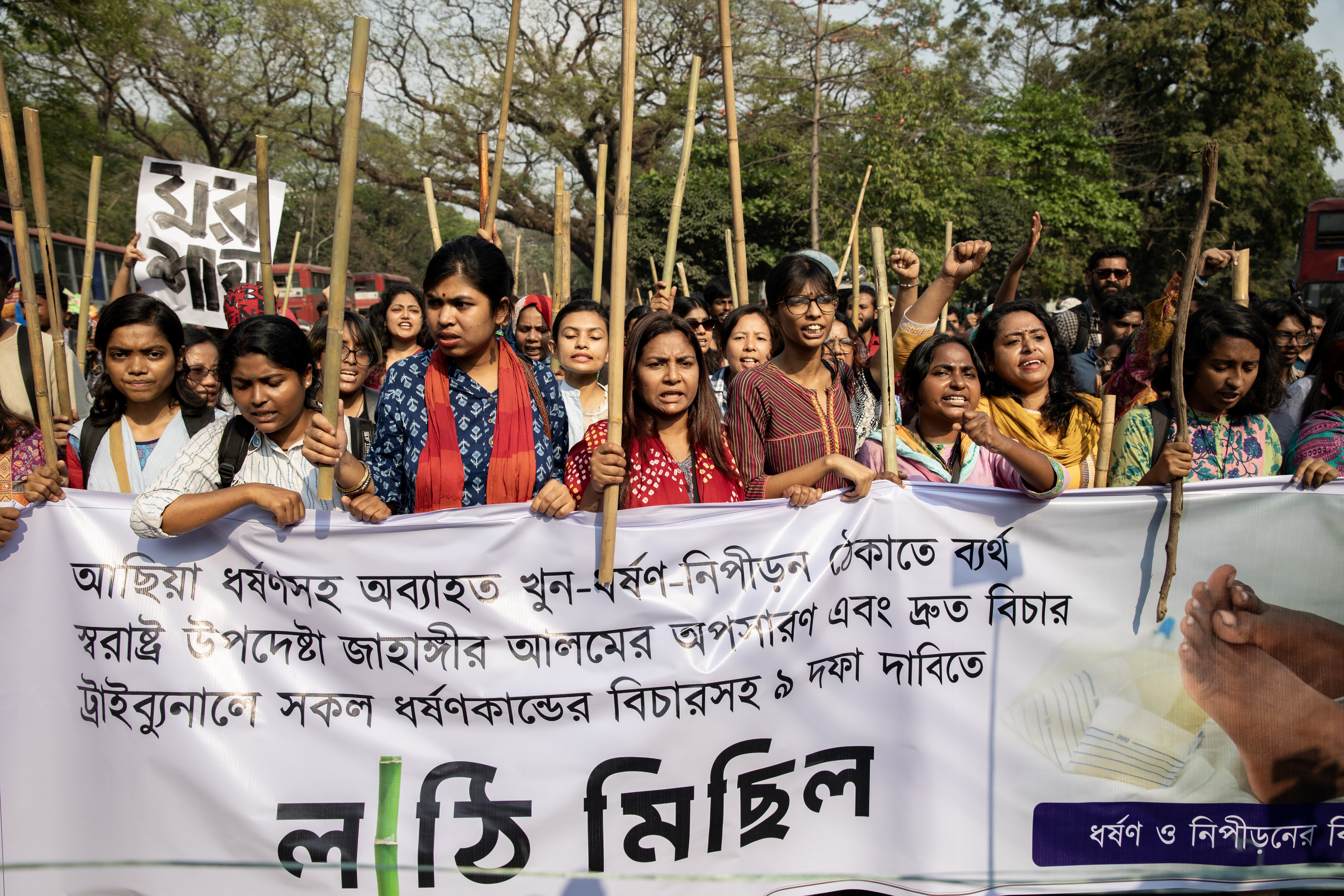Lalmatia’s lesson: Stop tiptoeing around women’s safety

In a country where women's safety is often treated as a footnote, the recent assault on two young women in Dhaka's Lalmatia area is a glaring indictment of our societal and legal failures. On March 1, 2025, these women were harassed, assaulted, and humiliated in broad daylight for the audacity of smoking in public—a choice that, while debatable health-wise, is hardly out of the ordinary. Let's break it down, shall we? The Smoking and Tobacco Products Usage (Control) Act bans smoking in specific public spaces, i.e. hospitals, educational institutions, government offices, transport hubs, etc. Nowhere does it say that a woman lighting a cigarette in an open space is committing a crime punishable by public flogging. Even if they did break the law (which they explicitly did not), the penalty would be a fine. Not mob justice. Not assault. Not the kind of humiliation that makes women think twice before stepping out of their homes.
The incident escalated from verbal abuse by a man in his 60s to physical assault. The man decided their choice to smoke in public was unacceptable. That was all it took. The message was clear: a woman doing something that men don't approve of is not just a woman making a choice. It's a provocation, a challenge, an invitation for society to collectively decide whether she deserves punishment. Because Bangladesh currently is united only in its hate for Hasina and misogyny.
The man in question has been taken into custody. Meanwhile, as rape cases continue to rise, anti-rape protests are shaking Dhaka to its core. In response, the government has decided that the best course of action is to shorten the period of investigation and expedite justice, because, clearly, efficiency is the missing piece in our broken system. But I have thoughts. Thoughts on how this isn't just about faster trials but about reforming laws that were drafted in a different century, by and for a different generation. Thoughts on why we need to go beyond just addressing rape and finally tackle the gaping holes in our laws on sexual harassment.
The problem isn't just the assault, it's the fact that this is how the system is designed to work. The man who attacked them did it because he knew he could get away with it. Because this country has built a culture of impunity so strong that a woman being harassed in public is just part of the scenery. And when she dares to fight back? That's when the real outrage begins. Not over the fact that she was assaulted. No, the outrage comes from the fact that she didn't just quietly accept it. That she had the audacity to push back.
Where was the law in all this? Oh, right. Nowhere. Because—and brace yourselves for this—Bangladesh does not have a law specifically criminalising sexual harassment.
Yes, that's right. A Law Commission draft for an anti-harassment law was submitted in 2010. It is now 2025. Still no law. Instead, we have a patchwork of outdated, vague provisions that do not go far enough. The Penal Code, 1860 criminalises "outraging a woman's modesty," as if we are delicate porcelain dolls who simply cannot bear the emotional trauma of some uncle making a lewd comment. The Prevention of Repression against Women and Children Act, 2000 deals with extreme cases—rape, abduction, acid attacks—but not everyday harassment.
Then there's the 2009 High Court directives on sexual harassment, a set of well-intentioned guidelines that are binding. But here's the intriguing part: guidelines are not laws. Since they exist to fill the gaps, it should not take a handful of legal minds more than a few months to push them into a statute. But it's been 15 years since the Law Commission report.
A 2021 analysis by the Bangladesh National Woman Lawyers' Association (BNWLA) revealed that 84 percent of women have experienced sexual harassment in workplaces and public spaces, including schools, streets, public transportation, and even at home. This is not just a number; it's a damning verdict on our collective apathy. And so, the reality remains unchanged: there is no standalone law in Bangladesh that protects women from harassment in public spaces. No law that clearly defines street harassment, no law that makes it a specific, punishable crime, no law that ensures immediate justice for the thousands of women who face this every single day. What we have instead is a system that tells women to just be careful. To be silent. To modify their behaviour, their movement, their clothing, their speech—anything to avoid attracting the kind of attention that men insist is inevitable. But it is not inevitable. It is allowed. And it is rewarded with the kind of casual indifference that makes incidents like Lalmatia possible.
What happened to those women is not an isolated event. Women are harassed on the streets, on public transport, in shopping malls, in universities, in workplaces, in their own neighbourhoods, in broad daylight, in the dead of night. Every single woman you know has a story (or more) of being grabbed, groped, something, anything. But what exactly is she supposed to do about it? File a police complaint so officers can smirk and ask if she "did something to provoke them"? Go to court and spend years trying to prove that, yes, she was harassed in public and no, it wasn't her fault? Wait for politicians to pretend to care for two days before they move on to something else? The public nature of the assault, the mob mentality, and the lacklustre response from the authorities highlight a systemic failure to protect women. The subsequent protests against the home minister's statements underscore people's frustration and demand for accountability. Every time something like this happens, there's a brief wave of outrage. And then, as always, it fades. The cycle repeats. And still, no law. No real change.
It's high time Bangladesh enacted a comprehensive anti-sexual harassment law that is actively enforced. Such legislation should clearly define sexual harassment and leave no room for ambiguity, covering verbal, non-verbal, and physical forms of harassment. The legislation needs to establish accountability mechanisms that mandate the formation of complaint committees in workplaces and educational institutions with the power to take decisive actions. A tribunal should be formed to ensure swift justice and implement fast-tracked courts to handle harassment cases, ensuring timely justice for victims. Meanwhile, nationwide campaigns should be promoted to educate the public about women's rights and the legal repercussions of harassment. This is a disease that needs to be uprooted and vaccinated.
The time for half-measures and lip service is over. Women in Bangladesh deserve more than token acknowledgments of their plight; they deserve concrete action. The Lalmatia incident should serve as a catalyst for change, propelling us towards a society where women can exercise their freedoms without fear of harassment or violence. Big words like feminism, matriarchy and empowerment need to be worth the ink used to write them. One legislation addressing the core issue of sexual harassment can make a statement bigger and better than a thousand wordy slogans and comments.
Barrister Noshin Nawal is an activist, feminist, and a columnist for The Daily Star. She can be reached at nawalnoshin1@gmail.com.
Views expressed in this article are the author's own.
Follow The Daily Star Opinion on Facebook for the latest opinions, commentaries, and analyses by experts and professionals. To contribute your article or letter to The Daily Star Opinion, see our submission guidelines.




 For all latest news, follow The Daily Star's Google News channel.
For all latest news, follow The Daily Star's Google News channel. 





Comments